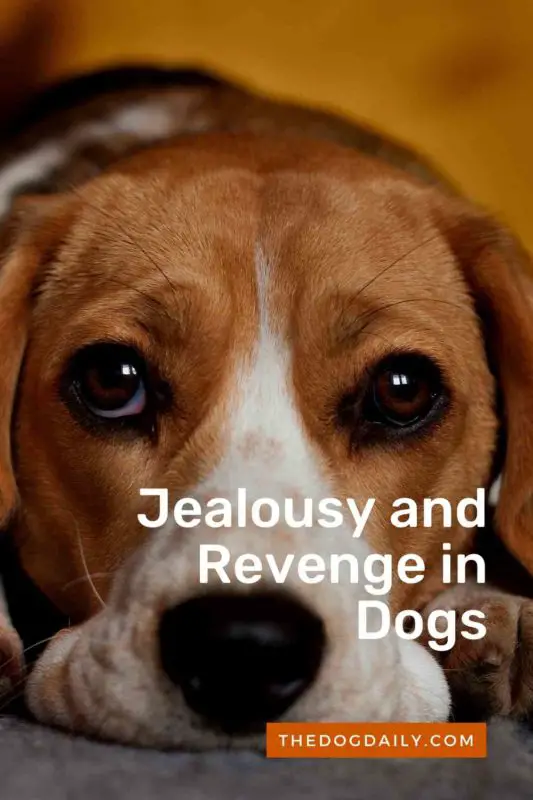Can Dogs Seek Revenge?
If your dog has gone to the bathroom on the floor while you were away from home, you’re probably wondering if it did this deliberately.
Humans are not the only animals who plot conscious revenge on others. As Stephen Beckerman, a Penn State anthropologist, points out: “Widespread in the animal kingdom is the behavior of returning injury for injury. Animals as varied and as far from us as blue-footed boobies, elephant seals, side-striped jackals, and European moorhens are called punishers. They regularly respond to injuries by attacking the culprit who has injured them.”
You might think that mental injuries could be included. Your dog gets depressed because it is lonely and restless. It, therefore, acts out by doing something you hate.
However, this is not the case.
Although dogs have good memories, they live more in the moment. When you come home and find the mess, your body language before you even say something to your dog may reveal your anger and cause your dog to react. Your dog, however, is not necessarily waiting for some mental satisfaction that it got a reaction out of you. That behavior is tied to a phenomenon known as “theory of mind,” which requires a complex ability to understand and possibly even predict others’ thoughts.
Revenge is also more complicated than you might think. “Revenge is a desire to not just punish the culprit, but to change his mind, to make him see, if only in his death throws, that he was wrong,” says Beckerman. Do you think your dog is plotting and planning all of this with its bowel movements? I strongly doubt it.
Do Dogs Poop For Revenge?
The more simple answer is that your dog is either stressed out or has no appropriate place to go to the bathroom without your guidance. Some owners crate their dogs during the day, but I view that as more of a last-resort solution. Try to reinforce bathroom training. If your dog is not very big, you might install some baby gates to prevent access to certain areas of your home. Dog bathroom mats can also help. They often have the look and feel of grass but keep the waste contained for easy disposal.
If possible, you should also consider getting a dog walker, pet sitter, or someone else to look in on your pet during the day. Boredom can lead to anxiety and then to bathroom issues in dogs. If your dog stays active and social, those problems are less likely to surface. Health issues could also be at work, so you might additionally schedule a veterinary visit to rule those out.
For more suggestions on curbing your dog’s indoor bathroom behavior, see our article ‘What Do Dogs Do When They Poop?‘
Can Dogs Chew For Revenge?
Your dog chews on your favorite shoes while its favorite toy bone is just a foot away. Is your dog crazy, lazy, or what?
Most dogs that chew, whether on shoes, facial tissues, or table legs, are just looking for a diversion, says Wayne Hunthausen, DVM, director of Animal Behavior Consultations in Westwood, KS. “Dogs chew to entertain themselves,” says Hunthausen. “Destructive chewing typically occurs between 4 and 18 months, when dogs are the most curious. Thankfully, most dogs grow out of it.
How Do I Get My Dog To Stop Destroying Things When Left Alone?
A variety of chew toys can help reduce inappropriate chewing, though some dogs will gnaw no matter what. “A puppy may tire of rawhide and want to explore new textures,” says Hunthausen. “Shoes and socks have an organic odor many dogs can’t resist.
Separation anxiety can also provoke destructive chewing. Tamara Prince of Montclair, N.J., was surprised when Jake, her 4-year-old Cocker Spaniel mix, started snacking on clothing from the hamper as soon as she left the apartment. “I would come home to find him looking like a kid caught with his hand in the cookie jar. He looked guilty but chewed up my clothing as revenge for leaving him alone all day.” Tamara eventually had to use a crate training regiment to break Jake of the chewing habit and be more careful with her laundry placement.
Inappropriate chewing can also be dangerous since many household items are harmful to your pet. Some plants, for example, such as certain types of ferns and lilies, are poisonous to dogs. Chemicals in furniture, bedding, and clothing may also cause harm to your pet, not to mention the mouth splinters your dog might suffer if it chews on anything made out of wood. These household dangers make it even more imperative that non-toxic toys designed for dogs should be in easy nibble reach of your dog. If you ever suspect that your pet has ingested a poisonous substance, the ASPCA operates a 24-hour telephone hotline every day of the year: 888-426-4435. (Please note that calls may result in a consultation fee that could be applied to your credit card.)
How Do You Stop Destructive Chewing?
Save your shoes for walking. Keep these tips in mind to help your dog stop inappropriate, excess chewing:
- Offer a variety of chew toys.
- Don’t leave young dogs unsupervised. Crating is OK for a brief period, but a special room or exercise pen is recommended if you’ll be gone for a long time.
- Never physically punish your dog for inappropriate chewing. Clap your hands when you catch your dog, then redirect the pup to a more appropriate object.
- Exercise your dog often.
Your dog may still choose to chew regularly, but at least you can rest easier knowing that it will be less likely to chew on something undesirable, like your favorite tennies or that heirloom blanket.
Jealousy and Dogs
For ages, many animal experts held that all dog behavior, including possible jealous tendencies, stemmed from instinct rather than emotions, but new research is proving that theory wrong. So, if you recently brought a new friend or another pet into your life, and your dog suddenly seems less than friendly, you may have a jealous dog on your hands.
Do Dogs Get Jealous?
Paul Morris, Ph.D., a psychologist and animal behavior expert at the University of Portsmouth in England, determined that certain animals, including dogs, experience a wide array of emotions. Along with jealousy, these emotions include anger, anxiety, surprise, pride, embarrassment, and shame.
While cats, pigs, horses, rabbits, and hamsters also seem to get jealous, dogs appear to feel this emotion more often and with greater intensity. Dog owners included in the study consistently reported that their dogs pushed in between themselves and third party rivals for their attention.
Scientists still can’t communicate with dogs to know what they are truly feeling, but the evidence so far suggests that canine emotions, including jealousy, are comparable to what we experience.
“All we can do is look at behavior and context,” Morris said. “Both the behavior and the contexts observed are consistent with current scientific definitions of jealousy. I suspect that a highly social species such as the dog has a very developed repertoire of social emotions.”
He and others plan to study animal emotions more in the future.
How Do You Know When Your Dog is Jealous?
Like a spurned lover, your dog will have a hard time containing itself if it feels jealous. Sulking, snarling, growling, fighting, and sluggishness can be symptoms of jealousy. Some dogs even get so upset that they stop eating. In that case, be sure to schedule a veterinary check-up to rule out possible medical causes.
Do Dogs Get Jealous When You Get Another Dog?
Dogs can behave jealously if a new dog comes into your home. If we look at this from your dog’s perspective, it was with you first. Your dog has attempted to earn your loyalty and affection over the years while sharing those same gifts with you. Its jealousy is a measure of how much it values both you and its position within your now-growing pack.
How Do I Stop My Dog Being Jealous?
What should you do if you suspect your dog is feeling jealous? Here are a few guidelines:
-
Recognize the Signs of Jealousy in Your Dog
Your dog can be showing a range of jealous-like behaviors, such as; aggression towards the ‘opposition,’ attention-seeking (pushing in, doing something good or bad for a reaction, licking you), sulking, or even withdrawing. These are all signs that your dog is feeling insecure.
-
Maintain Routines For Your Dog
You likely have a daily routine for interacting with your dog, even if you did not establish this routine consciously. Think back to what your schedule and habits were like before the new pet or person was introduced, and, whenever possible, try to reestablish that pattern with your dog. Routine is essential to your dog because its jealousy, in part, comes from fear of losing its place in your life. By continuing to feed, walk, and play with your dog on a regular schedule, you reassure your pet of its place in your heart.
-
Give Extra Attention to Your Jealous Dog
Try to spend even more time with your dog than usual during the transitional period. If the subject of your dog’s jealousy is another person, encourage that individual to play, pet, and otherwise positively interact with your dog as much as possible.
-
Reinforce Basic Dog Training
Your dog thinks of you as part of its pack. Now it must share you with another
individual. You must remain the leader, so gently show your dog who is boss by verbally scolding negative behavior as soon as it starts. At the same time, reward positive behavior with sweet talk, head rubs, and treats, especially if your dog makes an effort to socialize with your new pack member.
-
Empathize With Your Jealous Dog
Put yourself in your dog’s paws and see it from his point of view. He now has to share his world with someone else. Show your dog some empathy to help him through this period of insecurity.
Article written by Author: Scott Rose, Mary Kirkland, and The Dog Daily Expert


Pingback: 96 Times Pets Were Masters At Getting Revenge - The magazine that never fails to amaze
Pingback: 96 Times Pets Were Masters At Getting Revenge - Success Life Lounge
Pingback: 96 Of The Best And Funniest Pet Revenge Examples – Health Value